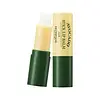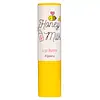What's inside
What's inside
 Key Ingredients
Key Ingredients

 Benefits
Benefits

 Concerns
Concerns

 Ingredients Side-by-side
Ingredients Side-by-side

Glass Beads
AbrasiveDiisostearyl Malate
EmollientLanolin
EmollientMicrocrystalline Wax
Emulsion StabilisingMangifera Indica Seed Butter
Skin ConditioningEthylhexylglycerin
Skin ConditioningWater
Skin ConditioningEuphorbia Cerifera Wax
Persea Gratissima Oil
Skin ConditioningPolyethylene
AbrasiveHydrogenated Castor Oil
EmollientHydrogenated Coconut Oil
EmollientHydrogenated Polyisobutene
EmollientParfum
MaskingMusa Sapientum Fruit Extract
Skin ConditioningHydrogenated Poly(C6-14 Olefin)
EmollientGlass Beads, Diisostearyl Malate, Lanolin, Microcrystalline Wax, Mangifera Indica Seed Butter, Ethylhexylglycerin, Water, Euphorbia Cerifera Wax, Persea Gratissima Oil, Polyethylene, Hydrogenated Castor Oil, Hydrogenated Coconut Oil, Hydrogenated Polyisobutene, Parfum, Musa Sapientum Fruit Extract, Hydrogenated Poly(C6-14 Olefin)
Petrolatum
EmollientDiisostearyl Malate
EmollientMethyl Hydrogenated Rosinate
PerfumingCaprylic/Capric Triglyceride
MaskingRicinus Communis Seed Oil
MaskingMicrocrystalline Wax
Emulsion StabilisingOctyldodecanol
EmollientCetyl Ricinoleate
EmollientOzokerite
Emulsion StabilisingPolyethylene
AbrasivePhytosteryl/Isostearyl/Cetyl/Stearyl/Behenyl Dimer Dilinoleate
Skin ConditioningHydrogenated Vegetable Oil
EmollientDicalcium Phosphate
AbrasiveHoney Extract
HumectantMilk Protein Extract
Glycerin
HumectantPolyglyceryl-2 Triisostearate
EmulsifyingTocopheryl Acetate
AntioxidantWater
Skin ConditioningPropylene Glycol
HumectantPhenoxyethanol
PreservativeParfum
MaskingCI 19140
Cosmetic ColorantPetrolatum, Diisostearyl Malate, Methyl Hydrogenated Rosinate, Caprylic/Capric Triglyceride, Ricinus Communis Seed Oil, Microcrystalline Wax, Octyldodecanol, Cetyl Ricinoleate, Ozokerite, Polyethylene, Phytosteryl/Isostearyl/Cetyl/Stearyl/Behenyl Dimer Dilinoleate, Hydrogenated Vegetable Oil, Dicalcium Phosphate, Honey Extract, Milk Protein Extract, Glycerin, Polyglyceryl-2 Triisostearate, Tocopheryl Acetate, Water, Propylene Glycol, Phenoxyethanol, Parfum, CI 19140
Ingredients Explained
These ingredients are found in both products.
Ingredients higher up in an ingredient list are typically present in a larger amount.
Diisostearyl Malate is an emollient and most often used in lip products. It comes from isostearyl alcohol, a fatty acid, and malic acid, an AHA.
As an emollient, Diisostearyl Malate helps create a thin film on your skin to trap moisture in. This helps keep your skin soft and smooth.
Microcrystalline Wax is created by de-oiling petroleum. It is highly refined and purified before being added to cosmetics.
Microcrystalline Wax is used to enhance the texture and create even consistency. It helps stabilize a product by preventing ingredients from separating.
Parfum is a catch-all term for an ingredient or more that is used to give a scent to products.
Also called "fragrance", this ingredient can be a blend of hundreds of chemicals or plant oils. This means every product with "fragrance" or "parfum" in the ingredients list is a different mixture.
For instance, Habanolide is a proprietary trade name for a specific aroma chemical. When used as a fragrance ingredient in cosmetics, most aroma chemicals fall under the broad labeling category of “FRAGRANCE” or “PARFUM” according to EU and US regulations.
The term 'parfum' or 'fragrance' is not regulated in many countries. In many cases, it is up to the brand to define this term.
For instance, many brands choose to label themselves as "fragrance-free" because they are not using synthetic fragrances. However, their products may still contain ingredients such as essential oils that are considered a fragrance by INCI standards.
One example is Calendula flower extract. Calendula is an essential oil that still imparts a scent or 'fragrance'.
Depending on the blend, the ingredients in the mixture can cause allergies and sensitivities on the skin. Some ingredients that are known EU allergens include linalool and citronellol.
Parfum can also be used to mask or cover an unpleasant scent.
The bottom line is: not all fragrances/parfum/ingredients are created equally. If you are worried about fragrances, we recommend taking a closer look at an ingredient. And of course, we always recommend speaking with a professional.
Learn more about ParfumPolyethylene is a synthetic ingredient that helps the skin retain moisture. It is a polymer.
It is also typically used within product formulations to help bind solid ingredients together and thicken oil-based ingredients. When added to balms and emulsions, it helps increase the melting point temperature.
Water. It's the most common cosmetic ingredient of all. You'll usually see it at the top of ingredient lists, meaning that it makes up the largest part of the product.
So why is it so popular? Water most often acts as a solvent - this means that it helps dissolve other ingredients into the formulation.
You'll also recognize water as that liquid we all need to stay alive. If you see this, drink a glass of water. Stay hydrated!
Learn more about Water